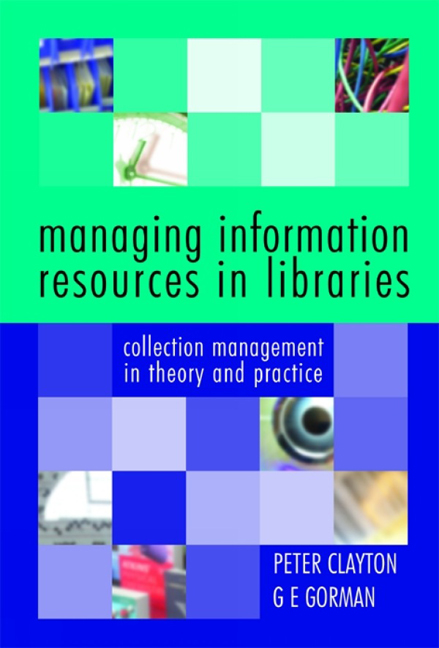Book contents
- Frontmatter
- Contents
- About the authors
- Preface
- 1 Managing information resources in context
- 2 Collection management and collection development policies
- 3 Conspectus
- 4 Resource sharing and co-operative collection development
- 5 Selection: policies and procedures
- 6 Selection resources
- 7 Acquisitions processes and procedures
- 8 Budget management
- 9 Collection evaluation and review
- 10 Preservation and weeding
- The literature of collection management Adela Clayton
- Index
5 - Selection: policies and procedures
Published online by Cambridge University Press: 08 June 2018
- Frontmatter
- Contents
- About the authors
- Preface
- 1 Managing information resources in context
- 2 Collection management and collection development policies
- 3 Conspectus
- 4 Resource sharing and co-operative collection development
- 5 Selection: policies and procedures
- 6 Selection resources
- 7 Acquisitions processes and procedures
- 8 Budget management
- 9 Collection evaluation and review
- 10 Preservation and weeding
- The literature of collection management Adela Clayton
- Index
Summary
Focus questions
• Should libraries provide access to what clients say they want, or to what librarians believe they need?
• When is a decision not to select, censorship?
• What are some distinctive features of the various library environments in which selection takes place?
• What are some common strategies that assist in the selection process?
• What are the standard selection criteria that apply in most situations?
• What factors should a library take into account in choosing the format in which to acquire an item? Are electronic formats different?
• Why is bibliographic checking essential?
Selection of resources is one of the critical professional tasks of the librarian – as important as cataloguing or information service, for of what value are these if there are not information sources available? Selection has long been a topic of professional discussion, enabling consideration of current issues associated with digital data and the internet to be placed in a well-understood framework.
The dilemma of selection – needs and wants
In the third edition of Developing library and information center collections and also at http://lib.lmu.edu/dlc4 Edward Evans presents a detailed summary of what he terms the ‘theory’ of selection based on 11 major textbooks published between 1925 and 1985. The principles in this extended analysis can be summarized in very few words: either need versus want, or quality versus demand. From this dichotomy stem the key principles on which responsible and responsive selection is built.
The first principle is that the reader is the central focus of selection, the raison d’être on which collection development and information services are built. While one information professional may argue that the selection of library materials should aim at providing users with exactly what they want, another might maintain with equal conviction that the library should qualify this approach by selecting the best material available that meets the users’ demands. A third librarian may go further, stating that the library should select simply the best there is without worrying about demand.
- Type
- Chapter
- Information
- Managing Information Resources in LibrariesCollection Management in Theory and Practice, pp. 73 - 101Publisher: FacetPrint publication year: 2006



